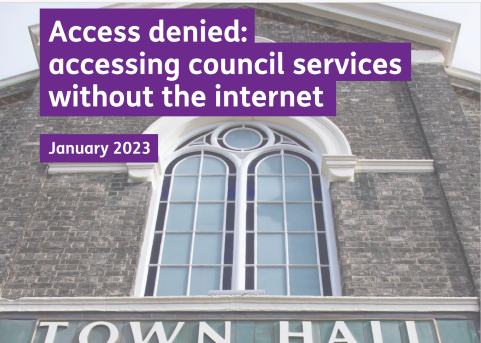Access denied: accessing council services without the internet

Published on 16 January 2023 12:22 PM
Access Denied: Digital-only council services exclude older Londoners who are offline
- Age UK London used a Freedom of Information request to find out about services available for offline residents
- A third (31%) of councils in London don’t offer a way to apply for Housing Benefit or Council Tax Reduction without using the internet
- The charity warns that digital-only services will be excluding some of the most vulnerable older Londoners from vital financial support
The campaigning charity, Age UK London, has released results of a Freedom of Information (FOI) request made to 33 London councils requesting information on the availability of support for people without internet access. The findings, based on the responses from the 29 councils who replied, are published in a new report entitled “Access Denied: accessing council services without the internet.” They show:
- Nine, or 31% of respondents, do not offer offline access to council tax reductions or housing benefit
- Eight, or 25%, do not offer offline access to Blue Badge applications
- Five, or 17% of respondents, do not offer any offline access to council tax rebates, council tax reduction, housing benefit and Blue Badge applications
As part of its Mind the Digital Gap Campaign, Age UK London is calling for action to tackle the barriers that face older Londoners who are offline. It is calling for decision makers and public service providers not to exclude those who cannot, or choose not, to use the internet.
In addition, mystery shopping conducted with twelve London councils showed that offline alternatives mentioned in responses to the FOI requests, did not always exist in practice. In just under half of all cases, the mystery shoppers were not able to obtain the information they sought about how it would be possible to apply for either housing benefit or council tax reduction without using the internet.
Abigail Wood, CEO of Age UK London said “The results of our Freedom of Information request and mystery shopping are worrying as it shows that older people who do not have access to the internet whether by choice or otherwise, are excluded from accessing important services.
“We found that the only way to apply for council services in many areas is by applying through the local authority’s website, filling in online forms and uploading identification documents. This can be challenging for people without digital skills or who lack confidence in using the internet. It completely excludes the 200,000 Londoners over the age of 75 who have never been online.”
Abigail Wood continued: “It’s especially concerning that one in three councils in London are excluding offline residents from applying for Housing Benefit or Council Tax Reductions during a cost-of-living crisis. This digital exclusion will be preventing older residents from accessing vital support to which they are entitled. A quarter of older Londoners live in poverty; councils with no offline alternative to accessing services are exacerbating this severe problem even further.
The charity is calling on all councils in London to offer high-quality offline alternatives to digital services so that everyone can access their services without relying on others. They are also calling for councils to ensure that their websites and online systems are accessible and easy to use including for those with limited digital skills or disabilities. These recommendations echoed the London Recovery Board’s A Fairer City report published last year which included as one of its actions “Make digital services accessible and provide alternatives for people without digital access.”
Wood concluded: “Councils need to assess the impact that only providing services online has for groups of people protected by the Equality Act and Public Sector Equality Duty, including older people.”
Age UK London are inviting older people to join local groups in the boroughs of Croydon, Redbridge, Westminster, and Merton to provide feedback on their experiences with local Councils. Contact campaigns@ageuklondon.org.uk for further information.
A copy of the Access Denied: accessing council services without the internet can be downloaded here. Printed copies can be requested by emailing campaigns@ageuklondon.org.uk.
ends
For further press information contact Dee Byrne, Age UK London, dbyrne@ageuklondon.org.uk or call 07986 378358
Editors Notes:
The Age UK network across London is experiencing an increased number of requests for assistance in contacting local councils. Age UK Bexley for example has recently opened a “digital café" to support older Londoners – this is a weekly drop-in where people can get help with using the internet and completing online applications for benefits, for example. Since opening the advisors are overwhelmed by the demand for help.
The types of requests for help include:
- Due to a recent cut in services, a previous partnership with Shelter is no longer available, this means easily accessible non-crisis housing advice is hard to come by.
- People struggling with housing benefit applications and renewal of benefits are finding they can only do this online
- It is difficult to find readily available information on housing options without having to go online
- Support with problems that arise including disputes with housing associations about maintenance and repairs are difficult to do as residents are being asked to report these online. Alternatively, they can call but hold on for long amounts of time to get through. Even after this, issues are not being dealt with.
One Age UK Senior Welfare Benefits Advisor said:
“Our information and advice services are being overstretched because access to council services is increasingly going online. For residents without access to the internet, and lack of one-to-one support at the council they revert to organisations such as their local Age UK for help and to get online on their behalf. This diverts from helping with other critical issues.
“The cost-of-living crisis has further increased the needs to access benefit support and so our advisers are overloaded with requests for help on a daily basis.”
